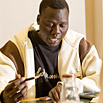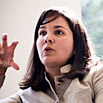|
|
 |

SCHOOL OF PSYCHOLOGY, FAMILY, AND COMMUNITY
MARSTON/WATSON HALL
206.281.2987
GRADADMISSIONS@SPU.EDU
WWW.SPU.EDU/DEPTS/PFC
Faculty, students, and staff in the School of Psychology, Family, and Community strive to become a community of learners: (1) Guided by faith. Exploring the implications of vital expressions of Christian faith for the human condition, as well as for emotional and relational healing and health. (2) Rooted in academic discipline. Fostering rigorous and creative learning environments, as well as contributing primary scholarship to the scientific study of psychological and social processes. (3) Committed to service. Grounding our learning community in the theory, research, and application of our disciplines in order to produce skilled graduates who can serve with character and competence in a broken world; nurturing creative partnerships with our local community and beyond in order to serve in and learn from socially and culturally diverse settings.
MISSION STATEMENT
The mission of the Marriage and Family Therapy (MFT) program at Seattle Pacific University is to provide
the highest quality education and training in marriage and family therapy in a distinctly Christian context. The
program focuses on the development of the self of the therapist through the integration of theory, research,
and practice - all within a social-ecology perspective and guided by foundational Christian principles.
People are viewed holistically, and training is guided by the values of openness, respect, curiosity, and
accountability.
PROGRAM DISTINCTIVES
Our training is offered through academic coursework and supervised clinical practice, leading to a master
of science degree in marriage and family therapy. The program provides a seven-quarter practicum
sequence that delivers fundamental and comprehensive clinical training. Graduates are equipped to
provide professional services as marriage and family therapists and to be effective participants in the everchanging
health care environment.
This degree can be completed in either a two-year (full-time) or three-year (part-time) sequence. In
exceptional circumstances students may also have up to four years to complete degree requirements. In
order to maintain active status in the program, students are expected to complete 24 credit hours per year.
Exceptions are to be approved by the chair of the marriage and family therapy program. Courses are
generally held during mid-afternoon and evening hours, Monday through Thursday, for 10 weeks. A typical
full-time schedule is as follows:
First year: Monday and Wednesday, 1:30-8:30 p.m.
Second year: Tuesday and Thursday, 1:30-8:30 p.m.
Full-time
employment is discouraged for those who intend to pursue the two-year program. Full-time
employment may be possible for those pursuing the three-year program. However, part-time employment is
preferable.
PROGRAM CURRICULUM
The MFT degree prepares individuals for supervised service in clinical and agency mental health organizations,
educational settings, and private psychotherapy. Other professional opportunities include educator,
consultant, mediator, administrator, and medical family therapist. Marriage and Family Therapy program
graduates work with individuals, couples, families, and groups. Students will become skilled in providing
professional therapeutic techniques in the treatment of family and individual issues based on a
systems/relational understanding of people's lives.
The program provides a seven-quarter practicum sequence that focuses on the development of the therapist and provides fundamental and comprehensive clinical training. This includes the following:
- Supervised internship at an approved site (500 hours of face-to-face client contact, of which at least
250 hours must be couples or family therapy).
- On-campus small-group supervision and individual/ group supervision at an internship placement site. One hundred (100) total hours of supervision is required, which will include at least 50 hours of
live, video, or audio supervision.
- A clinical portfolio, presented in the seventh quarter. This is an in-depth application of a theory to
clinical practice and the integration of the therapist with his or her clinical work. Supervisors
and clinical practicum supervision group members attend the final presentation.
Seattle Pacific University also offers a certificate in medical family therapy that can be incorporated into the
standard MFT curriculum. Post-master's students may also obtain a certificate in medical family therapy.
ACCREDITATION
In addition to regional accreditation by the Northwest Commission of Colleges and Universities, the MFT program at Seattle Pacific University holds national accreditation through the Commission of Accreditation for Marriage and Family Therapy Education (COAMFTE), the accrediting agency for the American Association for Marriage and Family Training Programs. AAMFT is the national professional organization dedicated to the practice of marriage and family therapy. Graduates with pos-master's degree experience are eligible to apply for licensure through Washington state's Department of Health. Five hundred (500) hours of clinical practice and 100 hours of supervision may be applied toward Washington state MFT licensure if an applicant graduates from the SPU MFT program. Licensure in more states follow COAMFTE curriculum and supervision requirements.
GENERAL ADMISSIONS INFORMATION
The program begins in Autumn Quarter and admits students once a year. The application deadline is
February 1. Listed below is a brief outline of University and program requirements for admission to MFT
students. For detailed information on admission, please visit The Graduate Center Web site at
www.spu.edu/graduate. You may also request an application packet by email at gradadmissions@spu.edu,
or by phone at 206.281.2091 or 800.601.0603.
- Applicants must have a bachelor's degree from a regionally accredited institution in any field.
Candidates will have a minimum grade-point average of 3.0 in the last 45 quarter credits (30
semester credits) of coursework completed before applying for admission, or in all undergraduate
work, whichever is higher.
- A minimum of 18 semester credits or 24 quarter credits in the social and behavioral sciences,
including a course in applied statistics and a course in individual life-span development, must be
completed (at a regionally accredited institution) prior to full admission to the program. Students
who have not already taken sufficient courses in this area are encouraged to take courses from the
following areas: theories of personality, theories of counseling, abnormal psychology, and
developmental psychology or family studies.
Applicants may elect to take the psychology subject test of the GRE. Those who earn a score of
500 or higher may waive any unfinished prerequisite coursework, with the exception of the statistics
and individual life-span development courses.
- A minimum score of 950 (only verbal and quantitative) for the Graduate Record Examination (GRE)
or 430 scaled score (35 raw score) for the Miller Analogies Test (MAT) is required. The test must
have been administered within five years of the deadline date for application to the program.
Further information on these tests can be obtained by calling the numbers listed below:
Graduate Record Exam
800.GRE.CALL or 800.473.2255
www.gre.org
Miller Analogies Test
800.622.3231
www.milleranalogies.com
UW Testing Center for (local applicants)
206.543.1170
If the candidate has earned a master's degree from a regionally accredited institution, he or she
can submit an official transcript on which the master's degree is posted and the GRE/MAT will be
waived.
Note: Candidates with significant qualifications and exceptional recommendations who fail to meet
the GPA or GRE/MAT minimum scores may still be considered for admission to the MFT program,
because the program admits all students on a probationary status (see "Admission Procedures").
- Applicants will submit three letters of recommendation, including (a) at least one from a person
professionally qualified to recommend for a field of this nature (e.g., mental health counselor,
marriage and family therapist, pastoral counselor, psychologist); and (b) at least one from a person
qualified to evaluate academic ability (e.g., educator). A third personal recommendation may
include a reference from an employer and/or supervisor from a volunteer experience.
Recommendation forms are included in the application brochure. Recommendations must be
submitted on the forms provided. Forms should be sent to the applicant in sealed and signed
envelopes to be included with the application package.
- Applicants will submit a typed personal statement. Please present a succinct statement that
provides an accurate indication of writing and grammatical skills. Generally, statements should be
three to four pages in length.
The personal statement should address (a) career objectives; (b) rationale for seeking the
degree and choosing to attend Seattle Pacific University; (c) personal interest in marriage and
family therapy; (d) professional and personal strengths as they apply to the mental health
profession; (e) related volunteer or work experiences; (f) the way in which personal and
professional life experiences have converged to motivate application to the MFT program; and (g)
other insights as deemed appropriate by the applicant.
- Those for whom English is not their first language must take the Test of English as a Foreign Language
(TOEFL), and present a minimum score of 550 on the paper-based test or 213 on the
computer-based test.
- Those who are not citizens or permanent residents of the United States must provide an official
confidential statement of financial support covering each year of intended enrollment.
- Those interested in the Medical Family Therapy Certificate need to request application materials for
this program also.
ADMISSION PROCEDURES
The Marriage and Family Therapy Graduate Admissions Committee will complete an initial applicant
screening process based upon the application materials only. Finalists are invited to meet with members of
the committee for an all-day group interview process in early April. It is highly recommended that applicants
participate in the group interview process. Telephone interviews are also permissible, but only in
exceptional circumstances.
Admission to the graduate program depends upon recommendation by the MFT faculty and approval from
the chair of marriage and family therapy. The entire process is usually completed within 10 weeks after the
final deadline date for applications.
All students are admitted on a probational status in order to allow faculty to be certain students are fully
prepared for placement in an internship site. Full admission is required in order for placement in an
internship site to occur. To be considered for full admission, students must complete a minimum of 11 units
in the MFT program, with average GPA of 3.0 or better in all courses, and must be recommended for
continuance by MFT faculty.
TRANSFER OF CREDIT
Students wishing to apply master’s degree level coursework completed at a regionally accredited institution prior to application must provide applicable transcripts and/or syllabi. Each course must be at least three graduate quarter credits and be equivalent to courses taught in the MFT program at Seattle Pacific University. A minimum grade of B will be needed for transferred work, and a maximum of 9 quarter credits may be transferred.

2006-07 Graduate Time Schedule | Academic Calendar | Graduate Homepage
Older Editions of the Graduate Catalog
2005-2006 | 2004-2005 | 2003-2004 | 2002-2003
|
 |
|










